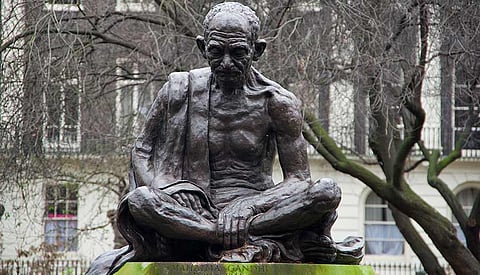

Be the change you wish to see in others – Mahatma Gandhi
As the world celebrated the 152nd birth anniversary of Mahatma Gandhi – the Father of the Indian Nation – on October 2, Nehru Centre London Director Amish Tripathi welcomed on to the virtual stage some geniuses from the Indian film industry who have successfully adapted Gandhian philosophy to our modern-day lives.
Filmmaker Raj Kumar Hirani and his partner in creation Abhijat Joshi took the floor to share anecdotes from the making of their iconic film ‘Lage Raho Munna Bhai’, which gave borth to the concept of “Gandhigiri”.
In a nuanced manner, Hirani and Joshi explain the true essence of the term. Gandhigiri, they say, is not to exactly follow the footsteps of Gandhi rather to voice your disagreement. It is to disagree in an agreeable manner. As the wise man himself said: “Don’t be afraid to speak out, even against me.”
MORE LIKE THIS…
Hirani harks back to his youth: “In school or college, I barely knew anything about Gandhi. Just certain chapters we had learned from textbooks, nothing beyond that. His presence was all around me, but nobody really spoke about him.”
Joshi adds: “Gandhi is on every note, every government office wall, but his ideals are nowhere. The same way, you will see statues of Florence Nightingale on streets in England but the hospitals are in the same condition she rebelled against.”
Upon watching Richard Attenborough’s ‘Gandhi’, the filmmaker began looking beyond what he was previously aware of. As he wrapped his head around Gandhi’s autobiography ‘The Story of My Experiments with Truth’ and ‘The Life of Mahatma Gandhi’ by Louis Fischer, he felt an urge to voice these ideologies which seemed to have evaporated from the world we were living in.
Hirani goes on to reveal that when he first began writing for his Gandhi-themed film, it turned out to be ‘grim and cynical’. Naively answering to these thoughts: “If Gandhi was alive in 1999, how would he have seen this country? Would he value this independence or would he wonder if this was the country he fought for?”
Joshi comments that “ideas cannot be killed” and indeed Gandhian principles are evergreen. Through the Munnabhai character, portrayed on screen by Sanjay Dutt, the duo brings a real-life goon together with the apostle of non-violence from history. The entire film, based on correcting Munna’s behaviour and attitude towards society, is nothing but abiding by Gandhian beliefs that are deeply ingrained within us.
Resorting to techniques of method writing, Joshi flipped every page on Bapu, went on a fast and even turned vegetarian before adopting a hilarious format for their storyline.
MORE LIKE THIS…
By applying the preaching into mundane actions, the audience can readily resonate with the scenes. Hirani notes that Gandhi’s mantra of “I am not going to fight with you but make you ashamed of your deed” is a form of protest in the most subtle way possible.
Hirani and Joshi get pensive while thinking about Gandhi’s reaction to the ongoing pandemic. Referring to John Ruskin’s ‘Unto This Last’, Joshi remarks: “Gandhi would want us to think about how the little man is suffering. Empathise with the least privileged and be generous for selfish reasons if needed.”
At a time when the world is fighting a common enemy, Gandhigiri should be cocooned in our hearts and our actions for humanity’s sake.
*Info: The Nehru Centre